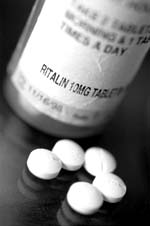If methadone is used to help with heroin addiction and nicotine replacement products are used to help with nicotine addiction, could a stimulant like Ritalin help with addiction to a stimulant like cocaine? That’s the question researchers asked in a new study, conducted at the Brookhaven National Laboratory in New York and recently published in JAMA Psychiatry. The results indicate that as little as one dose of the ADHD medication Ritalin (methylphenidate) could help cocaine addicts by improving their brain function through the modification of brain circuit connectivity. “This study shows promising short-term effects, and suggests the importance of conducting further studies to determine whether methylphenidate could be used as part of a treatment strategy for cocaine addiction,” said Anna Konova, a Stony Brook University doctoral student in Brookhaven’s Biosciences Department and the study’s lead author. Ritalin and Cocaine On the most basic level, Ritalin and cocaine are stimulant drugs. Ritalin is used for people suffering from attention-deficit hyperactivity disorder (ADHD) who generally have lower dopamine levels, display impulsive behavior and struggle to focus. The effects of stimulant drugs, which generally increase focus, alertness and productivity (through their impact on the neurotransmitter dopamine), mean they have the potential to help those suffering from ADHD, but they are also a class of commonly abused drugs. Cocaine and Ritalin are extremely similar in chemical structure, which means they create their effects in basically the same way. This is by preventing dopamine (the brain’s “pleasure” chemical) from being recaptured by the neurons, which means its concentration in the brain increases and effects such as euphoria are felt. Ritalin isn’t addictive in the same way as cocaine because it comes as a pill, so the chemical reaches the brain more slowly and the effects are less pronounced. However, some people abuse Ritalin by snorting the drug like cocaine or injecting it like heroin. This basically makes Ritalin as potentially addictive as cocaine or speed. Previous Research Since Ritalin could be thought of as a safer form of cocaine (when taken according to a doctor’s recommendations, of course), it has actually been studied in cocaine addicts before. The previous research showed that cocaine users performed better at cognitive tasks after receiving a dose of Ritalin and were more able to resolve mental conflict and ignore distracting emotional words. The Study The new research builds on the previous study, but extends it to look at the potential of Ritalin to help cocaine addicts. The study was small, based on a sample of just 18 cocaine addicts, but it’s still extremely promising for future addiction treatment. The researchers randomly assigned each of the participants to either receive a placebo or Ritalin, and aimed to look at the difference in the neural connectivity between the groups as a result. The ability of several regions of the brain to communicate with one another is thought to play an important role in cocaine addiction. The researchers in this study looked at two key areas of connectivity, one that is widely assumed to be central to habit formation (and therefore addiction formation) and another that is involved with the regulation of mood and control over behavior. In cocaine-addicted individuals (and the placebo group in the study), the habit-forming areas are highly connected and the ones responsible for regulating emotions and controlling behavior aren’t well-connected at all. The researchers found that a single dose of Ritalin has the ability to strengthen the connections between the regions responsible for controlling behavior and dampen the connections implicated in addiction. This means that although the drug Ritalin is similar to cocaine from a chemical perspective, the lower addiction potential could actually serve as some form of treatment for cocaine-addicted individuals. Theoretically, this research shows that it could even become a valuable tool in the treatment of cocaine addiction. “These changes in connectivity strength are consistent with a beneficial response to methylphenidate, extending its previously reported efficacy in normalizing task-related brain function and behavior in people addicted to cocaine,” Konova said. “By giving subjects methylphenidate, we are manipulating the level of dopamine, which is improving connectivity among key brain regions relevant to addiction.” Fighting One Addiction With Another? The only issue with the potential treatment is a fairly serious one, however. The fact that people become addicted to Ritalin itself means you could argue that giving people with drug habits a potentially addictive substance is not a solution; it just creates a new problem. This argument is virtually impossible to discount, because while taking the drug as prescribed drastically reduces its potential for addiction, it’s questionable whether people with problems regulating cravings and impulse control will be able to resist abusing the drug. In fact, that’s the problem in the first place. However, advances to the formula of OxyContin have made the drug much harder to crush, dissolve, and snort, thus reducing the addiction potential of the drug, and this could be accomplished with Ritalin too. In fact, the new research suggests that as long as the issue of the addictive potential of Ritalin is addressed in some way, it could be an extremely valuable tool for tackling cocaine addiction. Like other harm reduction treatments such as methadone, it could only be effective in combination with psychological therapy, however.

